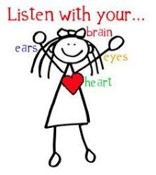Most people do not listen with the intent of understanding. They listen with the intent of replying. Stephen Covey
What is good communication? When I pose that question to workshop participants, they respond with ideas like empathy, knowing your audience, good eye contact, confidence, being engaging. But their most frequent response? “Knowing how to listen.“
While being confident, knowing your audience, having good eye contact, and being engaging are all important skills, good communication is all of that and more. Just as we recognize who our essential workers are, it’s important to identify our essential communication, and listening, is an essential communication skill.
WHAT IT MEANS
Listening is a psychological process that involves all senses. When we listen, we give thoughtful consideration to others‘ verbal and nonverbal expression.
NOT ALL LISTENING IS THE SAME
Listening to music or light conversation—Appreciative Listening—is different from listening to a colleague who wants to vent—Empathetic Listening. Discerning between facts and opinions differs from listening to directions—Critical versus Comprehensive listening.
Different conversations may require different listening approaches, so when uncertain, ask: Do you need to vent, want the facts, or are you interested in my opinion?
WHAT IMPACTS LISTENING?
- Narrow focus: If you don’t like a co-worker, you’ll probably notice their unhelpful comments but miss their constructive ones. Focusing on the negative, the Horn Effect, or only the positive, the Halo Effect, affects listening accuracy.Revisit conversations, emails, or solicit other’s input to ensure objectivity.
- Language: Using unfamiliar terms—abbreviations, jargon, or vocabulary—or offensive language can inhibit listening. Providing too much information, our attention span has gone from 12 -5 minutes in the past 15 years, can result in overload.Know your audience and what they value. Break up information or conversations so others can take it all in.
- Not ready: If you’re consumed by your physical or mental state i.e. Hungry, Angry, Lonely, Tired (HALT), you ‘re probably not ready to listen.
At a recent virtual meeting, one participant shared her frustration communicating with colleagues who oppose her views. Since they all—including the meeting participant—believe they’re right, no one has been willing to listen.Jump-start any dialogue by being the first to listen; you don’t have to agree with another’s’ point of view. Others will pay attention to us when we start paying attention to them, but someone has to start. - Responses: If people don’t talk, we can’t listen, and we’ll miss valuable feedback, insights, or opportunities to connect.Name calling, evaluating, and criticizing puts others on the defensive. Unsolicited advice is a turn off. And hijacking conversations by making someone else’s story about you, will not engage.Recognize responses that discourage—even unintentionally—others from wanting to share their ideas.
TIPS
Set an intention/outcome. For example: Letting others complete their thoughts before sharing your feedback or experiences.
Be Curious. Listening is interactive. You may need to clarify a message by either paraphrasing someone’s language: “ So what you’re saying is …,” or your observations: ” I noticed that you ….” And, if someone is resistant, ask: “I’m curious why ….”
Listening builds trust, fosters respect, and strengthens rapport. As we learn to embrace our changing workplace and world, it’s essential that we all do our part and learn how to listen.